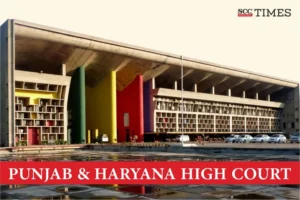Punjab and Haryana High Court: In a petition filed under Section 4821 of the Criminal Procedure Code, 1973 (‘CrPC’) seeking to quash the criminal complaint under Sections 3232, 5063 and 344 of the Penal Code, 1860 (‘IPC’) and Section 3(x)(ii)(viii) of Schedule Castes and Schedule Tribes (Prevention of Atrocities) Act, 1989 (‘the SC and ST Act’), a Single Judge Bench of N.S. Shekhawat, J., Court observed that in the present case, Respondent 2 had filed an FIR by alleging that the petitioners (‘accused persons’) had used caste related derogatory remarks against him. However, the Court stated that it had nowhere been mentioned in the complaint by Respondent 2 that the accused persons were aware that he belonged to a scheduled caste. Even otherwise, the utterances did not constitute an offence as the alleged incident had not taken place in a public place. Thus, the prosecution of the accused persons under Section 3(x)(ii)(viii) of the SC and ST Act, as such, was not warranted.
Background
The present case was instituted by the complainant (‘Respondent 2’) by alleging that he was a resident of Khang village and belonged to Majbhi caste. He worked as a farm labourer with ‘X’. In the morning of 17-07-2012, when Respondent 2 was working in the village of ’X’, Accused 1, who was the owner of land adjacent to the land of ‘X’, came there and threatened Respondent 2. Accused 1 threatened him and asked him not to work there, otherwise, he should be done to death.
On 19-07-2012, when the complainant was working in the fields of ‘X’, accused persons came there carrying sticks in their hands and used caste related abuses against Respondent 2. Thereafter, all the accused persons had beaten him up and he suffered injuries and was treated at a Civil Hospital. After the incident, the accused persons colluded with the local police and registered FIR under Sections 3245, 3266, 3417 and 506 of IPC against Respondent 2 and others. Respondent 2 remained in jail from 15-09-2012 to 28-01-2013. It was alleged that even in jail, accused 2 had used caste related abuses against him.
Respondent 2 was released from jail on 28-02-2013 and on 29-01-2013, the accused persons surrounded him and threatened him that earlier he might have been saved, but now they will not leave him. The accused persons further stated that after suffering injuries, they will get registered one more case against Respondent 2 and again send him to jail. Thereafter, the accused persons ran away as many persons had gathered on spot. Respondent 2 submitted applications and recorded his statement in the Police Station, but no action was taken. Ultimately, he filed a complaint under Sections 323, 506 and 34 IPC and Section 3(x)(ii)(viii) of the SC and ST Act.
Analysis, Law, and Decision
The Court observed that immediately after occurrence of the incident on 17-07-2012, the matter was reported by the accused persons to the police and the FIR under Sections 324, 326, 341 and 506 of IPC was ordered to be registered against Respondent 2 and his co-accused. Further, Respondent 2 was arrested by the police on 15-09-2012 and was later released on bail on 28-01-2013. It was admitted case of Respondent 2 that from 20-07-2012 to 15-09-2012, he neither approached the police nor filed a criminal complaint against the accused persons.
The Court noted that Respondent 2 moved a complaint to the SHO on 29-01-2013 and filed the present complaint on 30-03-2013, i.e., after about eight months of the occurrence. Thus, it was apparent that there was a considerable delay in filing the instant complaint before the trial Court, which had not been explained by the prosecution even during preliminary evidence. The Court stated that this delay raised serious concerns regarding the veracity and purity of the allegations levelled by Respondent 2 and certainly affected the credibility and the evidentiary value of the allegations levelled by Respondent 2.
Further, the Court observed that in the present case, Respondent 2 had filed the FIR under Section 3(x)(ii)(viii) of the SC and ST Act by alleging that the accused persons had used caste related derogatory remarks against him. However, the Court stated that it had nowhere been mentioned in the complaint by Respondent 2 that the accused persons were aware that he belonged to a scheduled caste. Merely because Respondent 2 was employed by ‘X’ in a nearby fields was no ground to draw an inference in this regard.
The Court stated that it was not spelled out from the allegations that the accused persons were conscious of the fact that Respondent 2 belonged to scheduled castes at the time of the alleged incident. Even otherwise, the utterances did not constitute an offence as the alleged incident had not taken place in a public place. Thus, the prosecution of the accused persons under Section 3(x)(ii)(viii) of the SC and ST Act, as such, was not warranted.
The Court stated that in the present case, the complaint remained pending for several years and no application was filed by Respondent 2 under Section 2108 of CrPC and now no purpose would be served by ordering the prosecution of the accused persons, after a long delay of 14 years, when Respondent 2 and his co-accused have already been convicted in a criminal trial, relating to the same occurrence.
Thus, the Court quashed the complaint filed under Sections 323, 506 and 34 of the IPC and Section 3(x)(ii) (viii) of SC and ST Act, summoning order dated 18-03-2014 and all other consequential proceedings arising therefrom.
[Gurucharan Singh v. State of Punjab, 2024 SCC OnLine P&H 14105, decided on 25-11-2024]
Advocates who appeared in this case :
For the Petitioners: Tarunveer Vashisht, Advocate;
For the Respondents: I.P.S. Sabharwal, DAG, Punjab; Ritesh Aggarwal, Advocate.
Buy Penal Code, 1860 HERE
Buy Code of Criminal Procedure, 1973 HERE
1. Section 528 of Nagarik Suraksha Sanhita, 2023 (‘BNSS’)
2. Section 115(2) of Nyaya Sanhita, 2023 (‘BNS’)

